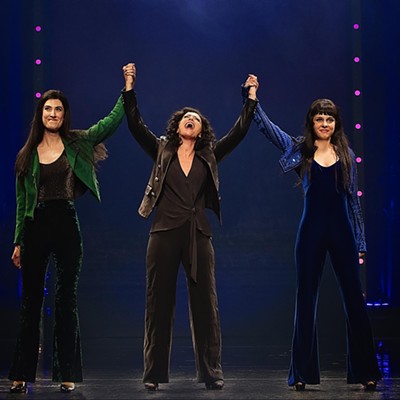It took five years for Venezuelan filmmaker Marcel Rasquin to bring his feature Hermano to the big screen. It was an exhausting, exhilarating and, ultimately, life-changing experience for him. "There were moments with Hermano that I didn't want to hear anything about it, that I wanted to hide it under a cover and not look at it," Rasquin says by phone. "Then when it was finally ready, it changed my life. I was able, in a small way, to become a spokesperson, an ambassador for Venezuela's filmmaking industry, for our culture. That's been very exciting for me."
The film, which is set in a dangerous slum in Caracas, was selected as an official entry to the Foreign Language category of the Academy Awards. The story features Graciela (Marcela Ciron) and her young son Julio, who find an abandoned baby, Daniel, in a pile of trash. They take him home, where Julio nicknames the baby Gato, "the cat," because of the kitten-like mewing sounds he makes. The three form an unofficial and tight-knit family. Fast-forward and the boys are now teenagers, both gifted soccer players, gifted enough to attract the attention of a professional scout. But their tryout is put in question when Graciela is killed in the cross-fire of a gang shoot-out. Julio (Eliú Armas) is bent on revenge, but Daniel (Fernando Moreno) takes his mother's death as one more sign that he has to get out of the slum. Both of them are in what they see as "any means necessary" situations.
Moreno and Armas both make their feature film debuts in Hermano. While their inexperience shows from time to time on screen, their natural talent is obvious.
At its core, Rasquin says, Hermano is a film about family, although not the biological kind. There's Daniel and Julio, as adopted brothers. There's Daniel and his soccer team. And there's Julio and his gang.
"I think that what makes us, what defines us in life has to do with the important relationships we have; many of those important relationships are with our family, with our siblings, our parents and children. That includes our adopted families, that is, our friends and the circles we move in. In the film, the team and the gang are also families. That's the key. That's one of the reasons that people connect with the film. It's a fundamental issue for everyone."
Determined to make his characters as realistic as possible, Rasquin infused them with all of the qualities that mark teenage boys eager to prove themselves, including the duality of light and dark in both young men. "I don't like to look at things as if they are just black and white. I don't like the convenience of 'Oh, okay, this is bad, this is good. Okay, now I understand everything.' Things are never that easy. There are always contradictions and complications in relationships. Julio is both good and bad. He has a code of honor that he lives by. He's not afraid of facing off with whoever to defend what's his. 'That's my brother and you don't mess with him. This is my team and you won't beat us. This is my neighborhood and you won't get over on us. This is my mother and I'm going to avenge her.' Even though he uses violence to get what he wants, he's honorable."
The filmmaker captured the duality of the neighborhood as well. "My approach to the neighborhood, to the slum, was precisely to show it without judgment, with honesty. Many filmmakers have a social agenda. They show the barrio by saying, 'This is a horrible place. There's nothing but violence and destruction. There are no values here. There are drug addicts here. They're going to kill you here.' Or they idolize the barrio. They say, 'These are lovely people, good people. These are people who help each other. There's solidarity here.' The reality is that the two things coexist. That's what intrigued me, what I wanted to explore and show. For example, the person who supports the soccer team and buys them uniforms is the same person that keeps the neighborhood soaked in violence and drugs."
Rasquin says that in telling one story of life in a Caracas slum, he told a greater truth. "I never had any pretensions of doing an anthropological study of Venezuela. My focus, the entire time that I was working on the movie, was on the story, on the characters. It's a story about family and the human condition that includes the social, but also transcends the social. In being honest with that singular story, Hermano connects with a universal element, a universal truth."
The film's universal message has touched viewers across Latin America, including one young man who stands out in Rasquin's mind. "One of the most wonderful things that happened to me with this film was when we showed it in a slum. We hung up a sheet on a wall in a basketball court, and screened the film for the community. Afterwards, a young man came up to me and said, 'I haven't talked to my brother for three years. I think I'll go home and give him a call.' That's the sort of thing that keeps me excited about this film."
Hermano opens in limited release in Houston on August 24. The seven local theaters screening the film include AMC Studio 30. For a full listing of theaters, visit the film's Web site.





